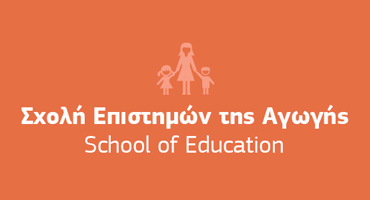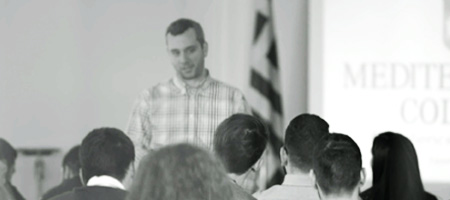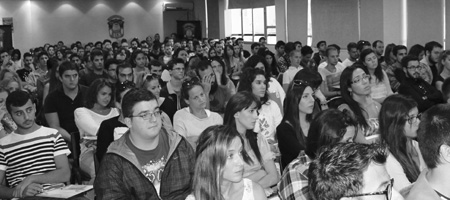





BA (Hons) English Language and TESOL (Teaching English to Speakers of Other Languages)
-
Unique combination of themes in the scientific study of English Language and Linguistics with a clear focus on English Language Teaching and 21s century Pedagogies.
-
80 hours of guided placement in diverse educational settings providing hands-on teaching practice.
-
Creative and experiential assignments. No written examinations.
-
Unlimited career opportunities in teaching, translation and editing.
Course Information
The BA (Hons) English Language and Teaching English to Speakers of Other Languages (TESOL) degree is a modern, forward-looking course aimed at equipping students not just with ‘traditional’ English language and linguistics subject knowledge and teaching skills, but also with the required awareness that will enable them to take advantage of the 21st century tools that enrich teaching and learning. The course gives students opportunities to develop skills through authentic teaching practice and to become articulate, knowledgeable, self-aware and creative graduates who can reach the zenith in the field of Education and related areas. Through this course, students will have the opportunity to study teaching English in a variety of contexts (very young learners, adult learners, learners with special educational needs, teaching English through Literature and authentic texts) along with modules pertaining to the scientific study of language such as sociolinguistics, psycholinguistics, multilingualism and intercultural communication.
The programme is offered in collaboration with the University of Derby, a university with a strong tradition and achievements in the field of Education (TOP15 in Guardian 2025).
In the BA (Hons) in English Language and TESOL at Mediterranean College you’ll delve into the mechanics of the English language, the dynamics of teaching, and the fascinating world of linguistics. Ever wondered why language changes so quickly or how multilingualism impacts the brain, and what implications this has for TESOL? Or how is technology transforming English language teaching? You’ll tackle these questions (and many more!) by exploring phonetics, syntax, sociolinguistics, and emerging fields like psycholinguistics and computational linguistics. This foundation will deepen your understanding of how language shapes identity and responds to social change, with a focus on recent advances in each area.
As a future English Language educator, you’ll also learn how to teach English to diverse learners—from young children to adult professionals and populations with special needs—across a variety of cultural and educational contexts. In today’s interconnected world, TESOL is more than just grammar drills; you’ll study innovative methods that embrace digital tools, gamification, and adaptive AI, all designed to make learning dynamic and relevant. Practical placements will give you hands-on experience, preparing you to respond flexibly to learners’ needs and thrive in a range of settings, from community classrooms to corporate environments.
Key programme areas include:
Comprehensive Language and Linguistics Foundation: Gain in-depth knowledge of English structure, language variation, and advanced fields like psycholinguistics and sociolinguistics, with an emphasis on current developments in each area.
TESOL Training for Diverse Learners: Develop effective, adaptable teaching strategies to engage diverse age groups and backgrounds, with a focus on 21st-century methods including digital tools.
Global and Practical Teaching Experience: Complete 80 hours of hands-on placement in various educational environments, equipping you with real-world experience and the flexibility to meet learners’ needs in diverse settings.
Focus on Research and Inquiry: Conduct an independent research project or dissertation, refining your critical thinking and analytical skills to contribute original insights to the fields of linguistics and TESOL.
Preparation for the Modern Classroom: Graduate with a well-rounded toolkit that combines linguistic expertise, innovative teaching techniques, and cultural awareness, ready to inspire language learners in an ever-evolving global context.
Ready to join the next generation of English Language professionals?
The course is designed to give you a robust foundation in language studies while developing your skills as an educator. In Year 1, you’ll explore the essentials of language structure—phonetics, grammar, syntax—and an introduction to TESOL and linguistic theory. You’ll learn how English varies globally and start analyzing how language functions in society.
Moving into Year 2, you’ll deepen your understanding with modules on psycholinguistics, sociolinguistics, and the global spread of English. This year emphasizes research skills, preparing you to investigate real-world language questions. You’ll also study language teaching methods tailored for diverse learners, exploring how to use technology and innovative strategies to enhance learning.
In Year 3, you’ll apply theory in practice. An 80-hour placement provides hands-on teaching experience in various educational settings, where you can refine your classroom skills. Alongside this, you’ll complete a dissertation or teaching project, allowing you to research a topic of interest or design a teaching initiative.
By the end of the course, you’ll have a comprehensive understanding of English language, linguistics, and TESOL, equipped with practical experience and research skills that prepare you for a dynamic career in language education.
Courses
Year 1
Teaching, Thinking, and Reasoning (20 credits)
Tailored for BA English Language and TESOL students, the module examines how teachers can cultivate critical thinking and reasoning skills in language learners. Through an interdisciplinary approach, the module connects principles from cognitive psychology, linguistics, and education to illuminate how thought processes affect language acquisition. Students will engage in hands-on activities to design lesson plans that integrate critical thinking strategies, fostering analytical and reflective abilities in learners. Key topics include cognitive biases in reasoning, methods to promote higher-order thinking, and techniques for evaluating language learners' comprehension and problem-solving skills. By the end of the module, students will have a strong understanding of how to create language learning environments that encourage intellectual curiosity, autonomy, and critical engagement—skills essential for language proficiency and real-world communication.
Multilingualism in Contemporary Society (20 credits)
The module offers students an in-depth look at the role and impact of multilingualism in today's globalized world. It examines the sociolinguistic, cognitive, and educational dimensions of multilingualism, exploring topics such as language policy, identity, and the cognitive benefits of speaking multiple languages. Students will investigate how multilingualism shapes social dynamics, impacts educational practices, and influences individual language development. Through case studies and practical activities, students will also analyze challenges and opportunities in multilingual settings, gaining skills to support language learners from diverse linguistic backgrounds. This module equips future language educators with the knowledge and tools to address the complexities of multilingualism in both classroom and community contexts.
Key Concepts in Linguistics (20 credits)
This module introduces students to essential ideas and frameworks within the study of language. Covering core areas such as phonetics, syntax, morphology, semantics, and pragmatics, the module provides a foundational understanding of how languages are structured and used. Students will explore questions like how sounds are produced, how words form sentences, and how meaning is conveyed in different contexts to develop analytical skills and a solid grasp of linguistic terminology, preparing them for advanced study in language and teaching. This module is designed to build confidence in linguistic analysis, equipping students with tools to explore and explain language from multiple perspectives.
Key Concepts in TESOL (20 credits)
The module introduces students to the foundational theories and practices in Teaching English to Speakers of Other Languages. Covering essential topics such as second language acquisition, diverse teaching methodologies, curriculum development, and assessment techniques, the module provides a comprehensive overview of the TESOL field. Students will explore communicative and task-based approaches, understand the impact of cultural and sociolinguistic factors on language learning, and learn strategies for effective lesson planning and classroom management. Through lectures, discussions, and practical exercises, students will develop the essential skills and knowledge needed to support diverse learners and create engaging, effective English language teaching environments. This module lays the groundwork for advanced studies and professional practice in TESOL.
Intercultural Communication for Professional Practice (20 credits)
The module equips students with essential skills for effective communication across cultures in educational and professional settings. This module explores how cultural differences shape communication styles, values, and expectations, addressing topics like cultural identity, nonverbal communication, and managing misunderstandings. Students will learn strategies for building intercultural competence, which is crucial for engaging with learners from diverse backgrounds and for collaborating in international workplaces. By the end of the module, students will be well-prepared to foster inclusive, culturally responsive environments in their future teaching and professional roles.
English Language in History (20 credits)
Examining major periods such as Old, Middle, and Early Modern English, this module explores how historical events—like invasions, trade, and colonization—shaped the English Language’s structure, vocabulary, and regional varieties. Students will study key linguistic changes in pronunciation, grammar, and spelling, while also considering how social and cultural contexts influenced the development of English. Through historical texts and linguistic analysis, students gain a deeper appreciation of how English has transformed over centuries and continues to adapt. This module provides essential background for understanding the diversity and global spread of English today.
Year 2
Language Structure and Use for TESOL (20 credits)
The module builds on foundational knowledge from Key Concepts in Linguistics, guiding second-year students through an in-depth exploration of English vocabulary, grammar, phonology, and semantics. Focusing on how language structure and use impact TESOL contexts, the module examines complex language patterns, discourse features, and pragmatics, equipping students with the analytical skills to address common learner challenges. Students will explore how native and non-native speakers use and understand grammatical structures, pronunciation nuances, and contextual meanings. Through hands-on activities, students will apply linguistic insights to real-world teaching scenarios, enhancing their ability to support diverse language learners. This module prepares students to create effective, linguistically informed lessons in their future TESOL practice.
Investigating Real-World Language (Corpus Linguistics) (20 credits)
This module introduces students to corpus linguistics, the study of language through large collections of real-world texts. In this module, students learn how to use linguistic corpora and digital tools to analyze language patterns, vocabulary, grammar, and usage in authentic contexts. They will explore how corpus analysis reveals insights into language variation, discourse styles, and frequency of words and phrases—skills that are invaluable for evidence-based language teaching. By examining diverse text types, students gain practical experience in interpreting data that reflects everyday language use. This module equips students with essential research techniques, preparing them to incorporate corpus findings into TESOL practices and fostering a deeper understanding of language in use.
Society in Language (20 credits)
The module introduces second-year students to the field of sociolinguistics, exploring the intricate relationship between language and society. Students will examine how factors such as culture, class, gender, and ethnicity influence language use and variation. The module covers key concepts like language attitudes, dialectal differences, code-switching, and language policy, enabling students to understand how social identities and power dynamics shape communication. By the end of the module, students will be equipped with the analytical tools to critically engage with sociolinguistic issues, enhancing their effectiveness as future educators in diverse language learning environments.
The Diverse Language Learner (20 credits)
The module prepares students to teach English to a wide range of learners in various contexts and for different purposes. Students will explore teaching strategies tailored for specific populations, including very young learners, adult learners, and those with special educational needs, emphasizing the importance of adaptability in language instruction. The module also addresses special purposes for language learning, such as academic, professional, and community-focused settings. With a strong emphasis on 21st-century tools and developments, students will investigate how technology, including AI and digital resources, can enhance language teaching and learning. Through practical applications and case studies, students will develop the skills necessary to create inclusive, engaging learning environments that meet the diverse needs of language learners today.
Ideology, Discourse and Power (20 credits)
This module equips students with essential insights into stylistics and discourse analysis. This module explores how language shapes and reflects ideologies, social power dynamics, and identity. Students will examine various discourse forms, including spoken, written, and multimodal texts, analyzing how language choices influence meaning and interpretation. Key topics include speech acts, narrative structures, and the role of context in shaping discourse. This module provides future educators with the analytical tools to critically engage with texts and understand the impact of language in social contexts, enhancing their effectiveness in teaching and communication.
Research Methods in Education (20 credits)
The Research Methods in Education module supports students in developing a strong foundation in research methodology. This module covers key concepts and techniques in qualitative and quantitative research, equipping students with the skills necessary to conduct effective educational research. Students will explore various research designs, data collection methods, and analytical approaches, gaining practical experience in formulating research questions and ethical considerations. Emphasis will be placed on critical evaluation of existing research and understanding how to apply findings in real-world contexts. By the end of the module, students will be well-prepared to undertake their final year dissertation or practical project, fostering their ability to contribute meaningful insights to the fields of language education and TESOL.
Year 3
Principles and Practice in TESOL I (20 credits)
Principles and Practice in TESOL II (20 credits)
These two modules form a cohesive chain of learning experiences designed for final-year BA English Language and TESOL students. Together, these modules provide a robust framework for understanding and applying key TESOL principles, combining theoretical insights with 80 hours of practical placement. Students will engage in lesson planning, classroom management, and assessment strategies, working directly with diverse learners in real educational contexts. Through guided placements, students will develop essential teaching skills, adapt their approaches to meet various learner needs, and reflect on their practice through peer collaboration and feedback. This integrated approach ensures that students emerge with the confidence and practical expertise required to navigate the TESOL profession effectively.
Language and The Mind: Psycholinguistics (20 credits)
This module invites final-year students to explore the intricate relationship between language and cognitive processes. The module delves into key topics such as language acquisition, comprehension, production, and the neurological underpinnings of language processing. Students will examine theories of psycholinguistics, including how children acquire language and how adults understand and produce speech in real-time and the relationship between language and thought. Through engaging discussions and empirical studies, students will develop an understanding of the cognitive mechanisms that facilitate language use and the impact of language on thought. This module equips future educators with valuable insights into how learners process language, enhancing their ability to support language development and address challenges in diverse educational contexts. By the end of the course, students will be prepared to apply psycholinguistic principles to their teaching practice.
The Globalisation(s) of English (20 credits)
The module offers students an insightful introduction to the diverse varieties of English spoken around the world. Through a sociolinguistic lens, students will explore how historical, cultural, and political contexts have shaped these varieties and their roles in global communication. The module examines the implications of English as a global lingua franca, addressing issues of identity, power dynamics, and the effects of globalization on language use. By engaging with contemporary debates, students will gain a deeper understanding of the complexities surrounding English's evolution and its sociopolitical significance. This module equips future educators with the critical perspectives necessary to navigate and appreciate language diversity in their teaching and professional practice.
Independent Study (40 credits)
This year-through module is designed for final-year students to engage in self-directed research while receiving guidance from an allocated supervisor. This series of workshop meetings provides students with the tools and support needed to undertake an independent study, culminating in the writing of a dissertation or an educational project. Students will refine their research questions, develop methodologies, and learn effective writing strategies, all while receiving personalized feedback on their progress. Emphasis will be placed on critical analysis, academic rigor, and ethical considerations in research. By the end of the module, students will have produced a substantial piece of work that reflects their interests and expertise, preparing them for future academic or professional endeavors in the field of language education.
Admission Requirements
This course is ideal for you, if you are a high school graduate of any discipline with the necessary English language skills, who aspires to build a career as an English Language Educator.
The minimum English language requirement is equivalent to IELTS 6.0 (B2). If you do not possess an official English language certificate, you can sit the College’s internal placement test.
Moreover, you’ll be asked to submit a reference letter from a tutor, and you’ll be called for an academic interview with the programme leader.
If you are a holder of a university degree in a relevant discipline or holder of a relevant qualification (e.g. CELTA/TEFL/TESOL), you may be granted exception in terms of academic years required to complete the course as your prior academic credentials may be recognised.
Application & Enrolment
We use a rolling admissions policy, so we accept applications throughout the calendar year until all available places are filled. In order to secure your place in your selected course and class, we urge you to submit your application in time.
We also offer multiple fee payment methods, individual payment plans and bursaries based on academic, athletic and socio-economic criteria.
Contact us today and find out more about this course and the available bursaries and funding opportunities. Our admissions advisors will provide you with all necessary information and will guide you through the application and enrolment process.
- 21st-Century Educator Focus: Designed to equip future language educators with the skills, technology, and adaptability needed to thrive in today’s diverse learning environments.
- The flexible and diverse teaching approaches endorsing digital technologies and flipped classroom pedagogical practices catering for different student needs and/or preferences.
- Creative, Personalized Assessments: Assessments are tailored to align with your personal interests and career aspirations—no written exams, only projects that showcase your strengths.
- Real-World Experience: Benefit from 80 hours of placement in diverse educational settings, providing valuable, hands-on teaching practice.
- Top-Quality UK Partnership: The University of Derby ranks 15th in Education in The Guardian University Guide 2025, underscoring its commitment to innovative and impactful teaching. This is by backed by Derby’s Gold rating in Teaching Quality (TEF 2023).
- Expert Faculty and Support: Learn from a dedicated team of TESOL and English Language who provide personalized guidance throughout your studies.
- Research or Teaching Project Flexibility: Pursue either an independent research dissertation or a practical teaching project, tailored to your academic and professional goals.
- Be art of the wider School of Education which provides students with ample opportunities for extracurricular activity and personal development including study visits, guest lectures, conferences, workshops etc.
- Collaboration with the MC English Language Centre for opportunities and further development.
Degree recognition
Your degree is recognised in Greece as professionally equivalent to degrees awarded by Greek state universities. It is also recognised by the UK NARIC as academic and professionally equivalent to any UK degree.
Click here for more information on the degree recognition procedure by Greek authorities.
Postgraduate study
With a degree in English Language and TESOL, you can choose from a plethora of postgraduate programmes. At Mediterranean College, you can, for example, attend:
Careers
Holders of a BA in English Language and TESOL degree can pursue various rewarding careers, including:
- English Language Teacher
- EFL Course Designer
- English Language Assessment Specialist
- Educational Consultant
- Content Creator
- Editor
- Translator/Interpreter
- Publishing
- Journalism
Testimonials
NOTHING WORTH HAVING COMES EASY... The road to get the Master degree was not easy ... With effort, help and moral support from my family and my beloved friends and fellow students, I managed to complete my graduate studies. HARD WORK + DREAMS + DEDICATION = SUCCESS ...
Panagiota Kokkinou, MA Education: Special Educational Needs & Disability
I would describe my course in the graduate programme as a unique and valuable experience, at both educational and personal level. The specialisation in the field of learning disabilities was the goal and the means was personal work and proper guidance from notable and valuable fellow-teachers. The completion of this journey combines the happiness of personal satisfaction and the joy for the beautiful moments I spent with new colleagues who...
Violeta Pavgerou, MA Education: Special Educational Needs & Disability
With the education I received from Mediterranean college and my wise professors, I am now ready to explore and teach, not only in schools but my children one day! Thank you for the wonderful years I!!!...
Tran Mychie, BA (Hons) Early Childhood Studies
NOTHING WORTH HAVING COMES EASY... The road to get the Master degree was not easy ... With effort, help and moral support from my family and my beloved friends and fellow students, I managed to complete my graduate studies. HARD WORK + DREAMS + DEDICATION = SUCCESS ...
Panagiota Kokkinou, MA Education: Special Educational Needs & Disability
I would describe my course in the graduate programme as a unique and valuable experience, at both educational and personal level. The specialisation in the field of learning disabilities was the goal and the means was personal work and proper guidance from notable and valuable fellow-teachers. The completion of this journey combines the happiness of personal satisfaction and the joy for the beautiful moments I spent with new colleagues who...
Violeta Pavgerou, MA Education: Special Educational Needs & Disability




